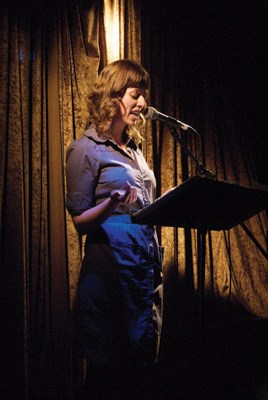The haikus were so lewd at last year's Haiku DeathMatch, one offended onlooker stormed out of Café Deux Soleils.
Having the audience judge the haiku-spitting competition by applause encouraged competitors in the annual event to appeal to the lowest common denominator, says an organizer of the fourth annual event, which takes place Aug. 8.
"It's this really fast-paced, lightening round poetry slam because you have just 17 syllables to try to convince the audience to get excited and vote for you," said Chris Gilpin, who won the first Haiku DeathMatch.
The dirtiest 17-syllable ditties aren't fit for print in the Courier, but this one helped Vancouver's haiku champion Duncan Shields claim his title last year: "Penis enlarger/ Worked too well. Now I can make/ Balloon animals."
"The year before, I wrote a lot of lyrical, kind of heartfelt stuff and lost," said Shields. "So then I wrote a whole bunch of dick jokes and then I won, much to my chagrin."
A panel of five judges randomly chosen from the audience will raise flags to communicate the match winner in their eyes this year, so Gilpin hopes more poignant, lyrical haikus will win.
"We're going away from the coliseum mob mentality," said Gilpin, program coordinator for Â鶹´«Ã½Ó³»Poetry House, which holds the Â鶹´«Ã½Ó³»Poetry Slam every Monday night on Commercial Drive and promotes poetry in schools and across the city.
The Haiku DeathMatch is one of the society's themed slam events.
Contenders need to prepare up to 26 original haiku to compete in all four rounds. This initially sounds intimidating, Gilpin says, but soon becomes habitual.
"Once you starting writing haiku, everything you see that is an amazing little sentence, you immediately start counting the syllables," he said. "You just have to find an idea that you can squeeze into 17 syllables."
Shields, who wins over audiences with his dirty diction and deadpan delivery, will compete against 15 other poets in the head-to-head tournament that will include former Â鶹´«Ã½Ó³»haiku champion Fernando Raguero-the nastiest scribe of them all, according to Gilpin-and Sara Bynoe, Literary Death Match victor.
Scotland's Ash Dickinson will visit Â鶹´«Ã½Ó³»for the first time to perform a feature slam, not haiku, set at the Haiku DeathMatch.
"He's just a character," said Shields who met Dickinson when Shields lived in Scotland. "He's a long, lanky guy with a great accent and a great sense of humour."
Dickinson is also one of the few working poets in the world, according to Shields.
"There're very few, like Mike McGee or Shane Koyczan, there're a couple of guys that just do it for a living, they are performers, and Ash Dickinson is one of those guys, so he's been honing his craft for the last, whatever, eight years."
Along with the title, this year's Â鶹´«Ã½Ó³»haiku champion will be awarded a cash prize of $30, the runner up $20.
"And all the participants will get a Hello Kitty prize," Gilpin added.
Gilpin said haiku will be performed in "zen-like silence" with "shooshers" on hand to amp up the sense of hilarity and fun.
Tazuo Yamaguchi started a haiku competition as the National Poetry Slam competition more than a decade ago, Gilpin said, and slam poets across North America were quick to take up the challenge and organize similar events.
Shields, who's been in the slam scene for five years and co-running the Â鶹´«Ã½Ó³»Poetry Slam for two, notes Marc Smith is credited with starting slam poetry in Chicago in the 1980s.
"He just said he was tired of poetry being in the hands of the intelligentsia or the elite and he just wanted to put it back into the power of the people, so he started handing out these judging cards to random members of the audience to make it into a contest and over time it's really picked up a lot of speed," he said.
"The really cool thing is that it's mostly young people, it's mostly teenagers, it's not just a bunch of old people in coffee houses saying the same old stuff to each other," the 39-year-old added. "It's young people really expressing themselves. That's kind of what it's all about.
"The points aren't the point, the poetry is the point-we all know that-but this is just a gimmick to get people in the door and it works," Shields continued. "We've got, like, 200 people every Monday at Café Deux Soleils and that's more than poetry's been pulling in since the mid '60s."
Nine "haikusters" had signed up as of the afternoon of Aug. 2 and Gilpin said some competitors will be able to sign up at the door.
For more information, see VancouverPoetryHouse.com.
[email protected] Twitter: @Cheryl_Rossi


